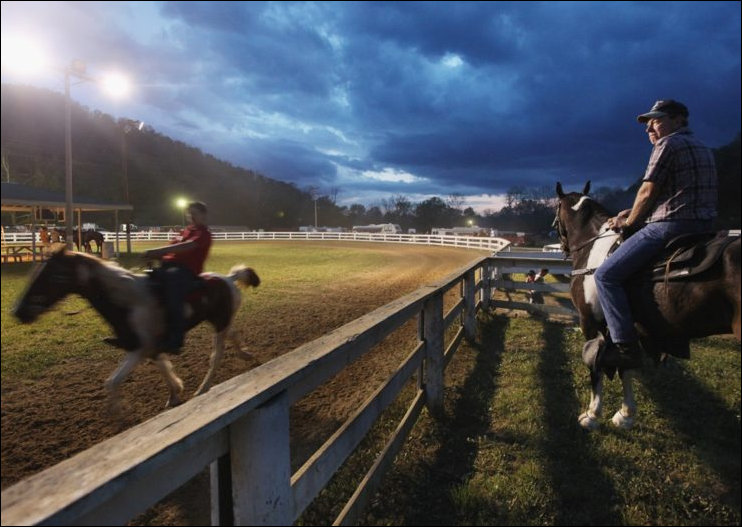
Horseback riding in Southwest Virginia. Photo credit: Rewire.
As Southwest Virginia struggles to adapt to the decline of the century-old coal industry, the region is taking a radical approach to economic development, reports Rewire. Writes the online Maryland publication: “Historically, natural resources in Appalachia have been mined, but southwest Virginia is trying to re-envision the hills, woods, and mountains of the state for outdoor tourism—and in the process, hold onto its younger residents.”
What is outdoor tourism? It covers the kind of activities one normally associates with the outdoors — hiking, biking, camping, fishing, kayaking, rock-climbing, horseback riding, and the like. But it also includes cultural assets such as the Crooked Road music trail and the Round the Mountain craft network.
No roller coasters or waterslide parks for Southwest Virginia. “We promote, preserve, and protect what’s unique to this region, so we haven’t invested in things that can be found in a variety of other locations,” says Jenna Wagner, marketing director of Friends of SWVA. “The Crooked Road, for example, is based on music that is specific to this region. We’re working to maintain that quality of [resources that are] really unique to the region that you can’t experience anywhere else.”
The initiative is yielding results — not transformative results, but perhaps something to build upon. Peter Hackbert, director of entrepreneurship for the public good at Berea College, has studied towns in Southwest Virginia such as Abingdon and Damascus (close to the coalfields but not in them). He interviewed 60 international travelers to the region from as far as Europe and Australia. “We saw people coming from out of state, enjoying themselves, and spending money.”
And the region seems to be doing a better job of hanging onto educated young people. According to the Friends of SWVA: “[T]he proportion of the SWVA population comprised of those 25-34 with a bachelor’s degree or higher was at 2.3% in 2000 and had increased to 3.04% by 2015. There is also a strong positive correlation between in the increase in travel expenditures and the rise in the young, educated population.”
Bacon’s bottom line: You can only make so much money and employ so many people off of bikers, back-backers and bluegrass concerts. The idea is to create amenities that people who live in Southwest Virginia can enjoy. Organizing fiddler concerts and developing access points along the Clinch River creates pride in community and provides recreational options that didn’t exist before. If such activities also help keep young people from moving out, that’s a big bonus. If out-of-town people decide to settle there, all the better. When the coal is all mined out, you build on what you’ve got — and Southwest Virginia has a distinctive, under-appreciated culture and a fantastic outdoors.


